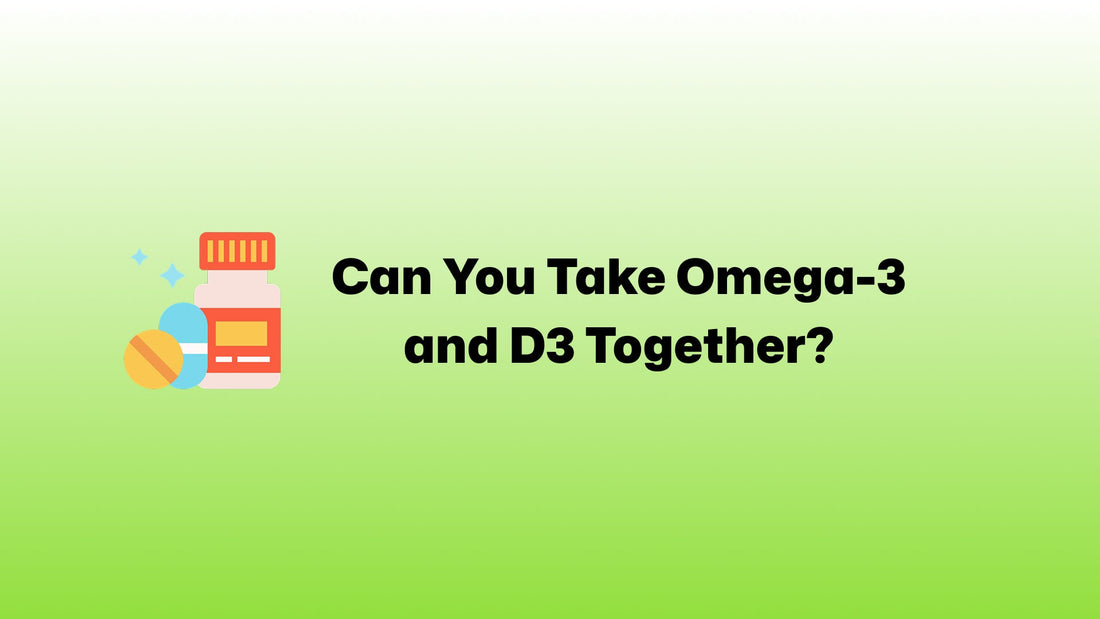
Can You Take Omega-3 and D3 Together?
Share
Modern supplement routines often involve multiple nutrients. Among the most popular are Omega-3 fatty acids and Vitamin D3, both of which are widely used to support general health. Many people take them daily, especially when looking to improve heart function, immunity, or bone strength. This naturally raises a simple but important question: Can these two supplements be taken together safely and effectively?
This guide explores whether it's safe to combine Omega-3 and Vitamin D3, how they work in the body, what benefits they may offer when taken at the same time, and what to watch out for.
Can You Take Omega-3 and Vitamin D3 at the Same Time?
Yes, Omega-3 and Vitamin D3 can be taken at the same time. They are often included in combination supplements for convenience and better routine consistency.
Since both nutrients are fat-soluble, they follow similar digestion and absorption paths. Taking them together does not reduce their effectiveness. On the contrary, it can improve efficiency by simplifying your supplement schedule.
There are no known negative interactions between these two when taken at appropriate doses. Many multivitamin formulas already include both, especially those focused on immune and heart health. For people with busy lifestyles or those managing multiple supplements, combining Omega-3 and Vitamin D3 is not only safe but also practical.
How Omega-3 and Vitamin D3 Work in the Body Together
Omega-3 fatty acids and Vitamin D3 support different systems but can complement each other. Omega-3 plays a role in heart, brain, and joint health, while Vitamin D3 helps regulate calcium and supports immune function.
They are not dependent on one another, but their actions in the body often overlap. For example, while Omega-3 contributes to a balanced inflammatory response, Vitamin D3 helps the immune system function properly. This means they can support the body’s natural balance when taken together.
In some cases, people taking both may notice improved energy levels, better focus, or stronger immunity. These effects are not guaranteed but are commonly reported when both nutrients are brought to healthy levels through consistent use.
While their main functions differ, combining them makes sense for anyone aiming to support multiple areas of health in a simple, unified way.
Benefits of Taking Omega-3 and Vitamin D3 Together
Combining Omega-3 and Vitamin D3 offers a more complete supplement strategy. Both support wellness, but in different ways. Using them together covers a wider range of health needs.
People who take both often do so to:
- Support heart, brain, bone, and immune health at once
- Avoid forgetting separate doses by taking one combined supplement
Vitamin D3 helps regulate how the body absorbs calcium and keeps bones strong. Omega-3 supports the structure of cells, especially in the brain and heart. Together, they help maintain important body functions without the need for multiple pills at different times.
Also, combining them into one step helps reduce supplement fatigue. This encourages better daily habits and leads to more consistent results over time.
Are There Any Risks or Side Effects of Combining Omega-3 and D3?
For healthy individuals using normal dosages, there are no known risks in taking Omega-3 and Vitamin D3 together. They do not chemically interfere with each other and are both considered safe supplements.
However, side effects may occur if taken in large amounts. High doses of Vitamin D3 may cause calcium buildup in the blood. Excess Omega-3 might lead to mild digestive upset or, in rare cases, affect blood clotting. These effects are uncommon and usually linked to very high doses taken without guidance.
If someone is on medication or has a medical condition, it's best to speak with a doctor before adding new supplements. But for the general population using recommended daily amounts, combining these two nutrients is unlikely to cause problems.
When Is the Best Time to Take Omega-3 and Vitamin D3?
The best time to take Omega-3 and Vitamin D3 is with a meal that includes healthy fat. This allows both nutrients to be absorbed more effectively by the body.
Since they are fat-soluble, they need some dietary fat to move through the digestive system properly. Taking them on an empty stomach can reduce how much your body absorbs. A meal that includes foods like eggs, cheese, nuts, or olive oil provides the needed fat for absorption.
Most people find that taking them with breakfast or lunch works well. These meals are often balanced and help form a routine. Evening can also be a good option, but large supplements might not suit everyone later in the day.
The exact hour is less important than taking them with food and being consistent.
Should You Take Omega-3 and D3 With Food or on an Empty Stomach?
Omega-3 and Vitamin D3 should always be taken with food, not on an empty stomach. Both are fat-soluble, which means they need some dietary fat for proper absorption.
Taking them without food may reduce their effectiveness. If your goal is to support your health, you want the body to get the full benefit. A small amount of fat, like olive oil, nuts, or eggs, is enough to help this process.
Some people take supplements in the morning without eating, which can lead to wasted nutrients. Others report mild nausea when they take Omega-3 alone. Eating first helps prevent that.
Building a habit around meals makes it easier to remember and improves absorption at the same time.
Who Should or Shouldn’t Combine Omega-3 and Vitamin D3?
Most people can safely take Omega-3 and Vitamin D3 together, but there are a few exceptions. If someone has a medical condition or is on medication, they should check with a healthcare provider.
Those who may benefit from combining these include people who:
- Eat little or no fish
- Spend limited time in sunlight
- Want to support brain, heart, and immune function
However, people with certain conditions like kidney disease, calcium disorders, or bleeding problems should not self-prescribe high doses. It’s important to get guidance to avoid unwanted effects.
Healthy adults looking for simple support can generally take both nutrients without concern. Choosing high-quality supplements and following the label instructions is usually enough.
Can Taking Omega-3 Improve Vitamin D Absorption?
Omega-3 does not directly boost Vitamin D absorption, but it helps create the right environment for it. Since Omega-3 is a source of fat, it supports the body’s ability to absorb other fat-soluble nutrients like Vitamin D3.
When both are taken with a meal, especially one that includes healthy fat, the absorption of Vitamin D improves. The fat from the Omega-3 supplement itself may help trigger the digestive process needed to absorb Vitamin D more efficiently.
This is one reason why combination supplements that include both nutrients are growing in popularity. They simplify the routine while also supporting better absorption, especially when taken with food.
While Omega-3 is not a direct booster, it plays a helpful role in how the body handles other nutrients during digestion.
